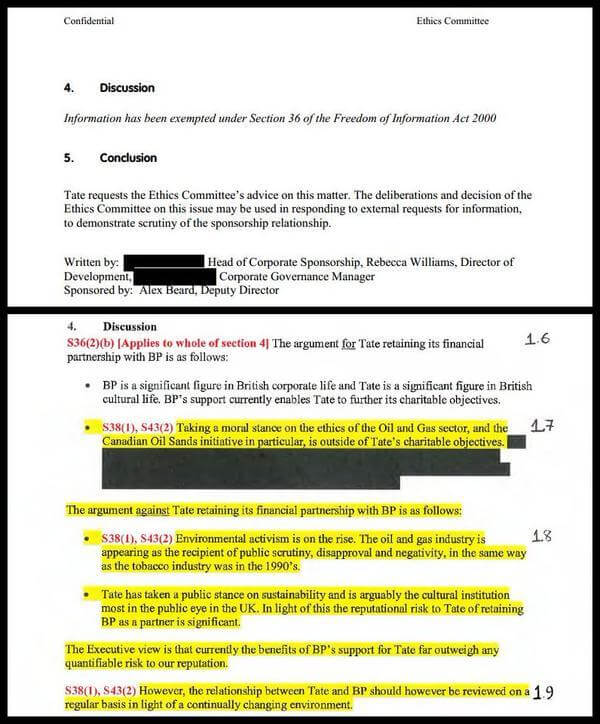by Bridget McKenzie
Bridget McKenzie is a cultural learning consultant and director of Flow UK. Previously she was head of learning at the British Library for five years, and was Education Officer for Tate.
This article is part of ‘Mind the Gap: expert evaluations of Tate’s ethical decision-making over BP’. For more expert comment and a summary briefing, see Mind the Gap. To view the original documents from Tate’s Ethics Committee (pdf), click here.
 After a careful review of its ethics policy triggered by the campaign against BP sponsorship, Tate’s Ethics Committee decided that
After a careful review of its ethics policy triggered by the campaign against BP sponsorship, Tate’s Ethics Committee decided that
‘Taking a moral stance on the ethics of the Oil and Gas sector remains outside of Tate’s charitable objectives’.
Tate’s criteria on sponsorship are that acceptance of funds
‘should not significantly damage the effective operation of Tate in delivering its mission, whether such acceptance: would harm its relationship with other benefactors, partners, visitors or other stakeholders; create unacceptable conflicts of interest; materially damage the reputation of Tate’, or in any other way.
This leads me to think that Tate’s ethical criteria are more about reputation management than ethics per se. Truly ethical criteria would drive Tate, as a charity, to hold policies and pursue practices that contribute to preserving the diversity of life and human culture on Earth.
Climate change, caused by consumption of fossil fuels, is an imminent, terrifying threat to life and its cultures. The oil companies, subsidised by taxpayers at $10m a minute while profiting from our consumption, are using cultural sponsorship to buy a social licence to operate and to stop us thinking about climate change.
Tate’s ethics committee considered BP’s environmental record but only in terms of local damage caused by the Tar Sands and the Gulf of Mexico disaster (Deepwater Horizon). The review did not consider the relationship of oil to climate change its devastating effects.
In its report to the Ethics Committee, Tate executive points out that there is (at the time of the review) no mention of criminal responsibility by BP for the Deepwater Horison disaster, which indicates a defensive bias towards BP rather than a neutral scrutiny. It also states that BP’s interest in Tar Sands was not mentioned on its website, which implies that Tate does not believe it has a responsibility to investigate beyond the surface of what it is told by any company.
The executive’s review did attempt to consider both sides in order to appear to be neutral. The argument against Tate retaining its financial partnership with BP is set out as follows:
‘Environmental activism is on the rise. The oil and gas industry is appearing as the recipient of public scrutiny, disapproval and negativity, in the same way as the tobacco industry was in the 1990’s. Tate has taken a public stance on sustainability and is arguably the cultural institution most in the public eye in the UK. In light of this the reputational risk to Tate of retaining BP as a partner is significant.’
This refers only to appearance, disapproval, and reputational risk, rather than the scientific consensus and deeply held values that drive environmental activism. This again underlines the extent to which Tate’s ethics on this matter are driven by reputation management.
Tate’s ethical policy contradicts its ‘Vision for Sustainability’ in which a priority is to
‘Inspire change in our networks and visitors, supporting societal shifts to a more
sustainable society’.
By ignoring the primary threat to a sustainable society, Tate is following the example of the corporate world in greenwashing. Tate is, in effect, outsourcing its commitment to environmental sustainability while denying those ‘networks and visitors’ any participation in decisions about sponsorship. Moreover, climate change impacts do affect Tate’s financial interest and key mission, because climate change may well lead to flooding of Tate’s sites and to economic collapse that will flatten cultural tourism.
I do not wish to blame any individuals or Tate in general for their decision not to take an ethical stance on oil companies. Their problem is one that Hannah Arendt pointed to about both genocide and ecocide – a lack of thinking. Her biographer, Young-Bruehl, summarised her views thus: “Arendt could imagine the ideologists of Economic Progress recommending and committing not just genocide but what she called, ecocide, destruction of the entire ecosystem on the earth”[1]. This destruction is now unfolding as we hear, amongst other dire news, that the Larsen ice shelf will disappear in 5 years. Our collective failure to think about it continues.
Tate’s decision arises from a common mistake of seeing the environment as separate, and consequently a belief that environmental justice is outside the rightful sphere of museums’ influence and therefore outside their ethical considerations. This separation arises from an assumption embedded in our culture that environment and social justice are distinct from each other, even opposed. It also arises from the fog of misinformation and denial perpetuated through fossil fuel company lobbying and sponsorship, which means that climate change and the impacts of oil are insufficiently regarded in future planning and ethics.
[1] https://thelearningplanet.wordpress.com/2013/09/26/nature-for-sale-or-arendt/